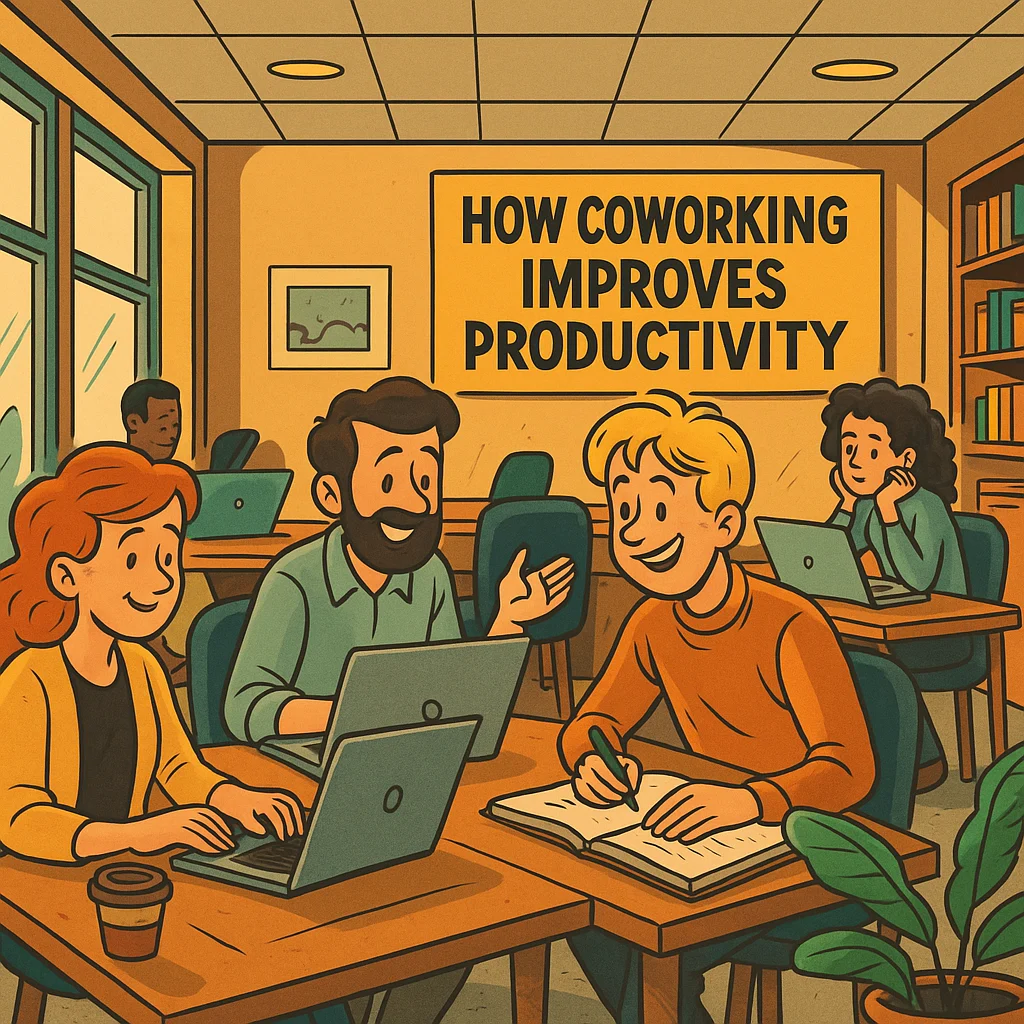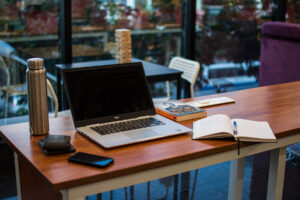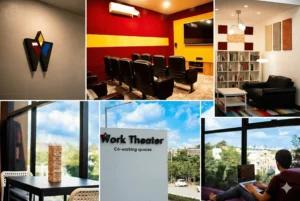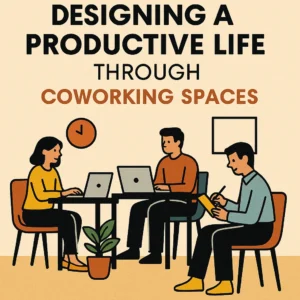In a world where work is no longer tethered to cubicles or even cities, the question isn’t can we work remotely — it’s how well can we work, together or alone? And deeper still: Does where we work affect how we work?
Coworking spaces emerged as a reaction to rigidity — a rejection of isolating home offices and uninspiring corporate floors. But their rise brought with them a deeper curiosity. Beyond the buzz, beanbags, and barista-made coffee — is there something truly productivity-enhancing about these environments?
Turns out, yes. But it’s not for the reasons most people think.
The Myth of Solitary Productivity
We’ve inherited a cultural image of the “productive genius” — a lone coder hammering at the keyboard in a dark room, a novelist lost in thought beside a dusty lamp. Solitude, in this image, is sacred. Noise is an enemy. Other people? A distraction.
But neuroscience and behavioral economics paint a different picture. Humans are deeply social and responsive to environments. We co-regulate attention. We mirror ambition. We thrive when we feel connected — not necessarily in conversation, but in proximity to others who are creating, building, shipping.
Coworking leverages that. It’s not about constant interaction. It’s about ambient accountability — the quiet motivation of being around others who are also moving.
Micro-Environmental Triggers of Productivity
Think of productivity not as a trait, but a state — one that arises from a complex cocktail of focus, energy, clarity, and motivation.
Coworking spaces are (when done right) designed to trigger this state:
- Natural light and open layout activate circadian rhythm and reduce fatigue
- Minimalist desk setups reduce cognitive load (see decision fatigue)
- Varied zones — silent corners, collaboration hubs, phone booths — align with different mental modes
- Presence of others working triggers “goal contagion,” a psychological effect where we unconsciously pursue visible goals around us
You can read more about the impact of coworking space design on mental states and outcomes.
The most productive people aren’t necessarily those with the strongest willpower. They’re those who design their environments to support the behaviors they value.
Breaking the Isolation Loop
Remote work unlocked flexibility. But it also opened a trap: isolation.
Many freelancers, entrepreneurs, and solopreneurs began noticing a creeping fatigue — not just physical, but emotional. Days blurred. Meaning dwindled. Momentum decayed.
Studies show that people who feel isolated experience:
- A 21% drop in cognitive performance
- Reduced emotional regulation (leading to impulsive breaks)
- Increased procrastination and burnout rates
Coworking — especially spaces for freelancers or digital nomads — act as an antidote. Without forcing constant socializing, they offer soft touchpoints: a quick nod at the coffee machine, shared silence in a focus zone, a post-work event on creative storytelling.
These aren’t distractions. They’re invisible anchors. They rehumanize the workday.
Designed for Focus, Not for Fluff
One common myth is that coworking spaces are all about casual vibes — but the best ones aren’t built for endless chatter or open-ended lounging.
They’re designed like modular engines of work:
- Hot desks for flow-state sprints
- Private studios for deep-focus tasks
- Community areas for serendipitous exchange
- Soundproof nooks for reflection or calls
Some of the most productive clusters of professionals — like writers and traders — thrive in these well-calibrated zones.
The real productivity hack isn’t a new app or AI tool. It’s a consistent physical environment that minimizes internal resistance.
Cognitive Ergonomics: Designing for the Brain
Good coworking spaces are ergonomically designed for the body. Great coworking spaces are cognitively ergonomic.
What does that mean?
- Color palettes aligned with psychological states (blues and greens for calm and focus)
- Furniture layout that reduces visual clutter and decision-making noise
- Ambient noise levels that maintain optimal alertness (research shows that 70 dB ambient sound boosts creative problem-solving)
- Access to nature or biophilic elements that improve executive function and attention restoration
These factors are embedded in some of Bangalore’s top spaces, like those curated for designers or architects.
It’s not decor. It’s neuroscience.
The Role of Routine and Ritual
Productivity isn’t just about space — it’s about rhythm.
Coworking creates a powerful ritual structure: leave home, arrive at the space, set intention, plug in, do focused work, unplug, return. This sequence reinforces habit loops, a proven productivity enhancer.
Unlike working from a café or home, there’s psychological separation between being and doing. The environment cues the brain to enter work mode — and exit when done.
Frequent users often share that they experience fewer attention drifts, less decision fatigue, and a stronger sense of closure at the end of the day. Some even describe a coworking space as an “anchor of momentum.”
If you’re trying to build habits around deep work, explore setups aligned with startup founders or freelancers in Bangalore.
Energy by Osmosis
There’s a strange force you feel when you walk into a room full of people building something.
You don’t even need to speak. Just being there charges you.
This is called collective momentum — and it’s a real phenomenon backed by mirror neurons and group dynamics. It’s why creators tend to cluster in cities. It’s why musicians thrive in studios. It’s why coworking spaces often become hubs of creativity and innovation.
When you work solo in a silent room, your energy is limited to your own willpower. But in a shared space, you borrow fuel from the group.
This is especially potent for creative professionals like artists, content creators, and filmmakers who thrive in energetic environments.
Contextual Creativity vs. Constant Output
Productivity doesn’t always mean output. It also means insight — and coworking excels here too.
Informal hallway conversations often lead to unexpected creative breakthroughs. As one study found, 84% of coworkers feel more engaged and motivated due to informal interactions (Deskmag Global Coworking Survey, 2018).
These micro-collisions lead to:
- Exposure to diverse perspectives
- Faster problem-solving via peer insights
- Creative reframing through dialogue
- Opportunities for business collaborations or referrals
Especially in ecosystems like content creators, entrepreneurs, and youtubers, these collisions become catalysts.
Reducing Friction = Increasing Flow
Much of productivity is about friction — the invisible drag that prevents us from starting or continuing.
Coworking spaces reduce friction by:
- Providing fast WiFi, unlimited beverages, and ergonomic chairs
- Eliminating decision fatigue (“where do I work today?”)
- Offering tools like whiteboards, printing stations, and meeting rooms
- Automating logistics so you can focus on your craft
If you’ve ever spent half a morning figuring out where to sit and what to order before beginning work, you understand the value of removing friction.
This alone justifies the modest cost of coworking day passes in Bangalore for many.
Belonging as a Productivity Multiplier
We often think productivity is a solo pursuit. But the desire to be useful — to contribute, to belong — is a deep emotional engine.
Coworking activates this through subtle social cues: shared calendars, joint projects, mutual accountability, recognition during events.
It’s especially powerful for:
- Therapists who thrive in healing-focused communities
- Journalists who benefit from quiet support and editorial exchange
- Small businesses looking to scale sustainably
The subtext: when you feel seen, you do better work.
Productivity as a Product of Place
Productivity isn’t about working harder. It’s about designing an environment that pulls your best work out of you.
Coworking spaces are not magic. But when done right — with clear zoning, community intelligence, emotional nuance, and frictionless design — they create conditions for clarity, momentum, and mastery.
So, does coworking improve productivity?
Yes. Not by command. But by craft.
It doesn’t force you to work. It invites you.
If you need a workspace in Bangalore, remember:
You can be more productive. You can use a good coworking space.
Call us to reserve your desk at Work Theater
Explore our podcast
Learn more about our coworking space on our YouTube channel Work Theater Studios where we talk about a variety of topics including personal finance, entrepreneurship, business and life.
Fun fact! We also have a private theatre in Bangalore




